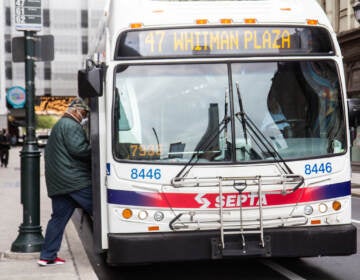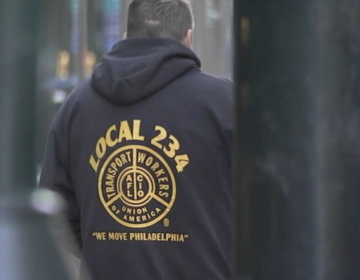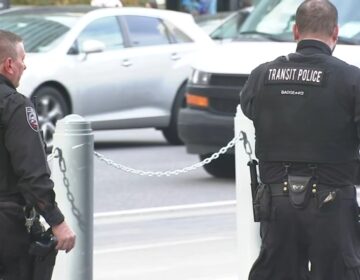SEPTA police union threatens strike
Transit police union leaders say the SEPTA department is losing officers to other departments in the city where they can get better pay.

A SEPTA police officer stands on the platform of the Somerset stop on the Market-Frankford line. (Emma Lee/WHYY)
From Philly and the Pa. suburbs to South Jersey and Delaware, what would you like WHYY News to cover? Let us know!
The union representing SEPTA police officers have approved a walkout and are threatening to hit the picket lines Nov. 20.
Union leaders said SEPTA’s police department has become a revolving door, with so many officers leaving the force because the transit agency doesn’t pay enough
“It’s a shame because, you know, we lose a lot of good people,” said Omari Bervine, who heads up the Fraternal Order of Transit Police that represents the officers. “It’s almost like we’ve become a training ground for other police departments. We train them up and then they get our well-trained officers.”
Bervine said Philadelphia police, Amtrak, even Temple’s police department have better pay and benefits compared to SEPTA.
“Nobody takes this job with the impression that they’re going to be rich. That’s not what we’re trying to do,” he said. “We’re trying to fully staff a police department and we haven’t been able to do that in years.”
SEPTA’s director of media relations Andrew Busch said the contract with the transit officers will be based on a deal recently made with the transport workers union.
“We engage in what we call ‘pattern bargaining,'” Busch said. “The TWU contract, that’s our biggest union, typically sets a pattern for all of our unions in terms of the number of years of the contract, wages, and benefits.”
Bervine said if SEPTA agrees to binding arbitration, they are willing to stay on the job.
The contract between the transit agency and the union expired on March 31, and the union is not barred from taking to the picket lines because even though the bargaining is being overseen by a state mediator, it is not binding arbitration.
WHYY is your source for fact-based, in-depth journalism and information. As a nonprofit organization, we rely on financial support from readers like you. Please give today.






